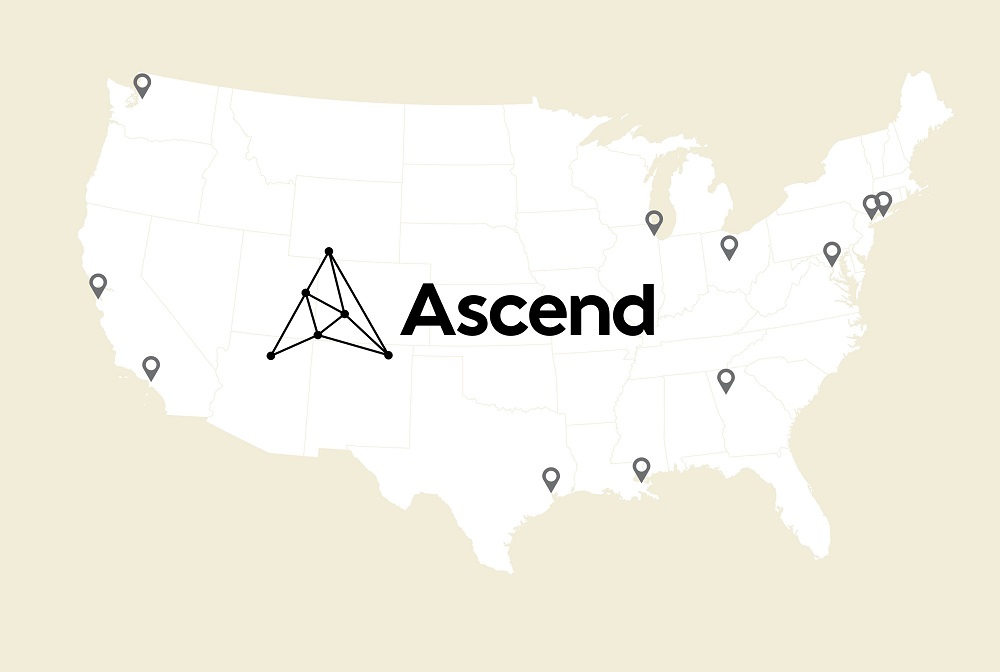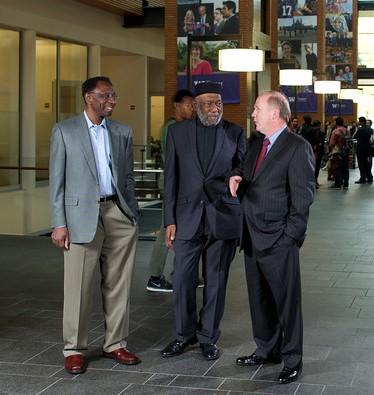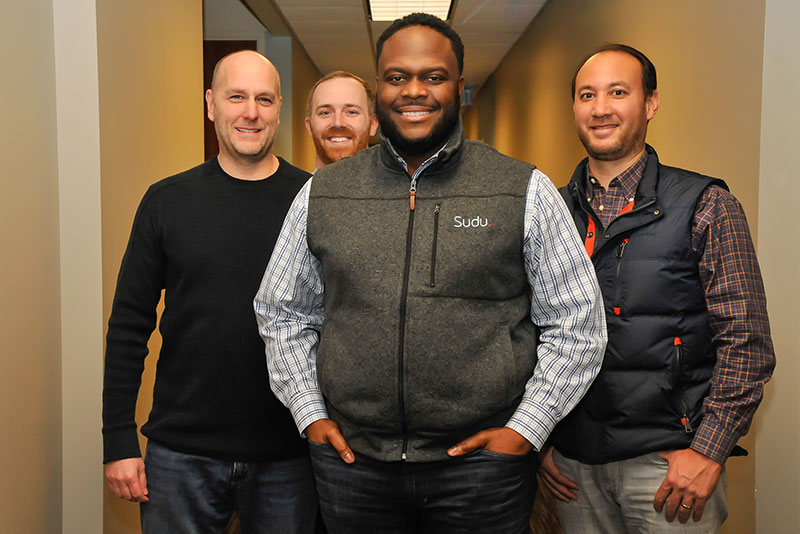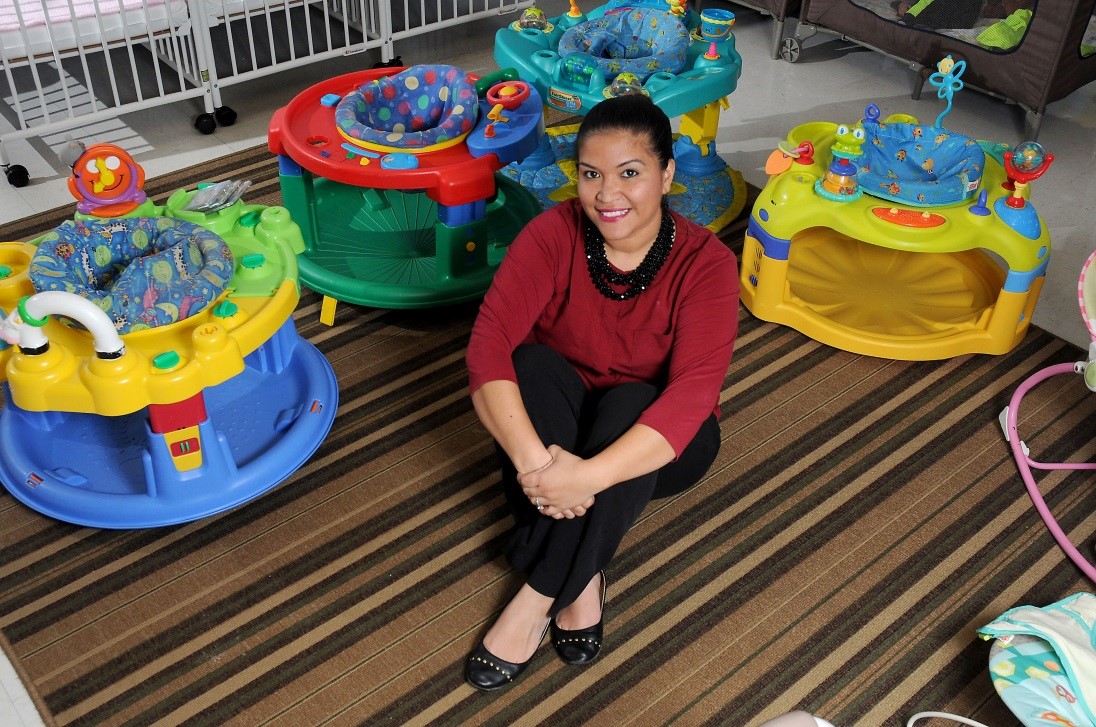Ascending America
Through an ambitious partnership with JPMorgan Chase, Foster’s Consulting and Business Development Center is expanding its impact nationwide
 In Atlanta, Amari Ruff has added Fortune 1000 customers and raised venture capital to scale Sudu, his tech-based logistics company that matches shippers with small independent trucking companies owned by people of color, women and veterans.
In Atlanta, Amari Ruff has added Fortune 1000 customers and raised venture capital to scale Sudu, his tech-based logistics company that matches shippers with small independent trucking companies owned by people of color, women and veterans.
In Houston, a critical loan and complementary management consulting helped Roxana Collazo realize her dream of opening Firefly Dual Language Academy, a progressive early learning center.
In Chicago, Jimmie and Tiffany Williams have rebranded their landscaping and snow removal business as Urban Roots, secured growth capital, signed commercial customers and doubled revenues in the past year.
In the Bay Area, Maria Palacio’s fair-trade, farm-to-bean roaster, Progeny Coffee, has seen ten-fold revenue growth after landing a big corporate contract, a loan to ramp operations and consulting to help manage this exponential growth.
What could this diverse set of rising businesses possibly have in common? For one, they are all founded and led by entrepreneurs of color. And their recent growth—often against great odds—has been supported by a new nationwide initiative created by the Foster School’s Consulting and Business Development Center (CBDC).
Ascend, a partnership with the global financial services firm JPMorgan Chase, is a national network of local business schools, non-profit lenders and B2B market makers focused on spurring business growth in their communities.
“These ecosystems address systemic challenges,” explains CBDC director Michael Verchot (MBA 1995), “with a goal of accelerating the growth of businesses owned by people of color, women and military veterans, especially those operating in inner cities.”
The Three-M model
Ascend is perhaps the logical evolution of the CBDC and its nearly 25 years of experience, expertise and insights supporting the growth of businesses owned and operated by people of color in Seattle and the state of Washington.
But the audacity to go national came from its long partnership with JPMorgan Chase.

Foster Professor William Bradford with Consulting and Business Development Center co-founders Thaddeus Spratlen and Michael Verchot.
During the Financial Crisis, Chase invested heavily in high-growth businesses to accelerate job creation around the country. But as the recovery picked up speed, it became apparent that some communities were getting left behind. Notably, the disparity between the fortunes of majority and minority owned businesses was growing wider. So Chase pivoted the strategy of its small business philanthropy toward addressing this disparity.
When Foster’s Consulting and Business Development Center wanted to convene a national conference of like-missioned programs and centers, Chase was all in.
In addition to building a national network and comparing best practices, the 2014 conference produced a moment of clarity.
That year William Bradford, the Business and Economic Development Endowed Professor of Finance at Foster, delivered his synthesis of 15 years of research on minority business development. He found that minority owned businesses underperform versus white-owned businesses due to systemic gaps in access to management education, money (loans, investment, personal net worth), and markets.
“None of us was surprised by the findings,” Verchot says. “But the data validated our hunches, identified the gaps in education, access and financing. And it clearly identified that the key to a solution is coordination across these challenges—something we had been practicing for years.”
Coalescing a coalition
At the end of the conference, Phyllis Campbell (MBA 1987), chairman of JPMorgan Chase, Pacific Northwest, posed a pivotal question to Verchot: what next? “Phyllis kept saying, think bigger, go bigger,” recalls Cat Martin, the firm’s Pacific Northwest regional philanthropy officer. “Think about what the endgame looks like and we’ll figure out a strategy to help you get there.”
That strategy became Ascend.
Chase invested $2.5 million in Verchot’s center to develop, train and coordinate a network of collaborative business growth ecosystems. Each would deliver the “Three-Ms” to underserved entrepreneurs.
“The idea that you need to address all three—management skills, money and market access—is simple, but it’s also true that many small businesses don’t have access to them,” says Ted Archer, the executive director of the Small Business Forward program at JPMorgan Chase. “It’s easy to say what’s missing, but difficult to bring those resources together. Ascend is a great vehicle to support the spirit of collaboration between organizations with shared goals.”
The program launched in 2017 in six metro areas: Atlanta, the Bay Area, Chicago, Los Angeles, Seattle and Washington, DC. Columbus, Houston, Long Island, New Orleans and New York are officially joining this year.
In each Ascend city, a local JPMorgan Chase philanthropy officer facilitates the collaboration of a lead partner—often a business school—and other organizations that provide B2B market access, community financing and management training. Chase also underwrites administration and funding in each locale.
“Ascend brings these pieces together in a way that’s really unique for the small business development work we’ve been doing at Chase,” says Archer.
Custom solutions
Verchot says that prior national efforts to develop minority owned businesses failed for lack of collaboration and flexibility.
“Because we’ve been doing this work the longest at the Foster School, we’re the model on which Ascend has been built,” he says. “But we’re not making carbon copies. No site looks exactly like Seattle.”
Every city has a different economy, different demographics and different challenges. Plus, the strengths and combinations of partner organizations are different. So Ascend operates without rigid rules. “Our approach is to provide direction, resources and some guardrails,” Verchot adds. “It would be really difficult to tell the partners in, say, Atlanta, exactly how to do their work.”
Indeed. Atlanta has its own unique set of challenges and opportunities. While the “Silicon Valley of the South” has exploded in recent years, business in the city’s predominantly African American south side has languished in negative growth.
 So Ascend Atlanta set out to spark minority-owned tech companies. “They hire the most, pay the most and can have the biggest impact on closing the wealth gap,” says Tiffany Bussey, director of the Entrepreneurship Center at Morehouse College, the program’s lead.
So Ascend Atlanta set out to spark minority-owned tech companies. “They hire the most, pay the most and can have the biggest impact on closing the wealth gap,” says Tiffany Bussey, director of the Entrepreneurship Center at Morehouse College, the program’s lead.
With Chase’s coordination, Morehouse has partnered with TechSquare Labs to provide management education, with Access to Capital for Entrepreneurs to offer small-business funding, and have brought in the Atlanta Wealth Building Initiative to facilitate market access.
The result has been two cohorts of 30 companies that have nearly doubled revenues and raised more than $4 million in growth capital, including Aquageneity, the first data-driven water quality rating technology, and Sudu, which aspires to be the Uber of commercial trucking.
And when Bussey saw the need, she was able to expand the cohort to include early stage startups and general businesses that are poised for growth.
“I love that saying: Think globally, act locally,” says Bussey. “That’s what Ascend allows us to do.”
Partnership power
Even more than local flexibility, the “killer app” of Ascend may be the network itself. Connecting the previously unconnected creates positive feedback loops across the USA.
In the Bay Area, Mills College is working with ICA Fund Good Jobs and Working Solutions. LiftFund partners with the City of Houston and Houston Community College for Ascend Houston. And Ascend New Orleans connects the business schools of Xavier and Tulane Universities and the New Orleans Business Alliance.
Ascend Chicago is about the only thing—short of a sporting contest—that could bring together the University of Chicago and Northwestern University. “On many levels they are competitors, cross-town rivals,” Verchot says. “But it turns out to be an amazing partnership when they come together for a common cause.”
That cause, of course, is reducing Chicago’s intractable wealth gap and the litany of social ills it causes.
 Both schools focus on areas of highest unemployment. But each approaches the challenge differently. Chicago’s Polsky Center for Entrepreneurship and Innovation dispatches student consulting teams to help minority owned businesses solve problems and grow. Northwestern’s Kellogg School offers an intensive cohort model of practical management education.
Both schools focus on areas of highest unemployment. But each approaches the challenge differently. Chicago’s Polsky Center for Entrepreneurship and Innovation dispatches student consulting teams to help minority owned businesses solve problems and grow. Northwestern’s Kellogg School offers an intensive cohort model of practical management education.
They work with Boston Consulting Group, with Axion and Local Initiatives Support Coalition (LISC) for access to capital, and with Chicago Anchors for a Strong Economy (CASE) and World Business Chicago for market access.
The whole package has supported the exponential growth of companies large and small. “We wouldn’t be where we are today without Ascend,” says Jimmie Williams of Urban Roots, a veteran of both Chicago programs.
He’s also hiring, which is the ultimate goal of Ascend Chicago—and everywhere else.
“We have societal issues that are bigger than business issues,” says Michele Rogers, the director of Chicago partnerships at Northwestern Kellogg. “But we know if people have education and jobs, violence and other social ills pretty much go away. So we’re addressing our piece of this here.”
Coming soon to a city near you
There is one other essential attribute to Ascend: ambition. The initiative was built to grow. And it is expanding—rapidly. Five more cities are vying to join the existing 11 in the Ascend network in the coming year.
 Two of the newest Ascend sites are serving very different populations of underserved entrepreneurs in the New York metro area. Ascend Long Island, led by Hofstra University, specializes in advancing businesses in low-income suburban communities. Ascend New York, led by the Mayor’s Office of Workforce Development, is an urban play.
Two of the newest Ascend sites are serving very different populations of underserved entrepreneurs in the New York metro area. Ascend Long Island, led by Hofstra University, specializes in advancing businesses in low-income suburban communities. Ascend New York, led by the Mayor’s Office of Workforce Development, is an urban play.
Nancy Carin, executive director of the Business Outreach Center Network, serves both burgeoning partnerships in different capacities. Her organization is the finance partner in Long Island and handles recruiting and management education in NYC.
“In both these communities,” she says, “We want these businesses to be leaders and a force for good, for economic justice.”
Nowhere is the virtue of community held more dearly than in NYC’s final frontier for gentrification. “The communities in the South Bronx don’t want to replicate Brooklyn,” Carin says. “They want more local ownership and local empowerment. So we’re really going beyond just supporting minority owned or woman owned or veteran owned businesses. We’re looking to grow local businesses, owned and operated by people who live in the community.”
There’s a lot of that going around.
Local heroes
This powerful mix of community and collaboration gets at the essence of Ascend.
“Equity is at the root of this,” explains Archer of JPMorgan Chase. “But as a firm with a large footprint, we’re not talking about community in the abstract. We are actively engaged in our communities. Ascend impacts our business as much as it impacts society.”
His colleague Cat Martin adds that she uses Ascend’s business growth collaborative ecosystem as model in the smaller markets she serves, too.
As for the founder of this national movement, Verchot admits that Foster gets as good as it gives. The national Ascend network is a means of gleaning innovations and crowd-sourced best practices that can benefit the Consulting and Business Development Center’s core work in Washington.
He co-founded the center nearly 25 years ago to spur the growth of businesses owned by people of color, women and veterans—especially in underserved communities. The result is more than $210 million in new revenue and over 200,000 jobs created or retained across the state.
Now Ascend is multiplying that impact. All over the national map.
“We’ve discovered a model that can begin to close the business performance and wealth gap, and sharing it is the right thing to do,” says Verchot, who’s developing a playbook to scale the program beyond the limits of his personal coaching and consultation. “Look at the slogan of the current UW capital campaign: For Washington, For the World.
“Ascend is our for the world contribution.”
Seattle Sweetness
As the model for the national Ascend program, the Foster School’s Consulting and Business Development Center is naturally the lead organization in Ascend Seattle—“First among equals,” as director Michael Verchot likes to say.
The center delivers the management education piece of the program’s Three-M model, which is the evolution of its Business Growth Collaborative. Access to money is provided by community lender Craft3 and market access by the local chapter of the Minority Supplier Development Council—with additional support from the center’s deep well of corporate and institutional contacts.
 The Ascend Seattle ecosystem accelerates growth of established firms owned by people of color, women and veterans. Successful alumni include Maricelys Borrero of American Abatement and Demo, Marti Hoffer of Lumenomics, Yuri Parreno and Ivonne Jurado of Ultrafino, Lewis Rudd of Ezell’s Famous Chicken, Nishit Mehta of HyGen Pharmaceuticals.
The Ascend Seattle ecosystem accelerates growth of established firms owned by people of color, women and veterans. Successful alumni include Maricelys Borrero of American Abatement and Demo, Marti Hoffer of Lumenomics, Yuri Parreno and Ivonne Jurado of Ultrafino, Lewis Rudd of Ezell’s Famous Chicken, Nishit Mehta of HyGen Pharmaceuticals.
Odette D’Aniello is the founder and CEO of Celebrity Gourmet Ventures, a sweet suite of specialty dessert companies. The Filipina developed a passion for cake decorating as a childhood escape from laboring in her uncle’s industrial bakery in Guam. Upon arriving in Washington state 20 years ago, she founded Celebrity Café & Bakery with her husband and brother.
“We had no clue how to run a business,” she admits.
After years learning at the school of hard knocks, D’Aniello found enormous value in the academic insights and invaluable network of the first cohort of Ascend Seattle. Then the second. Then the third.
Three years of Ascend has equipped D’Aniello to acquire several companies, to comprehend the vagaries of growth financing, and to scale sustainably. This has proved essential as she leveraged contacts in the Ascend ecosystem into a nationwide market for her Dragonfly Cakes—another acquisition—via high-end groceries including Whole Foods.
“I’m always learning,” D’Aniello says. “So when an opportunity like Ascend came along, I was all over it. It has given me a pathway and allowed me to see my business from so many different perspectives than I could see through the daily grind. Ascend has given me a wider lens.
“Now I want to send my team.”

